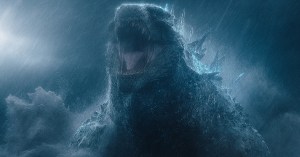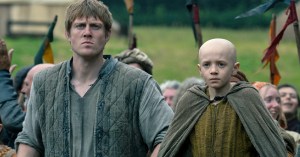Benicio Del Toro’s 10 Best Movies
In this week's Total Recall, we look back at the Sicario: Day of the Soldado star's best-reviewed movies.
With this weekend’s Sicario: Day of the Soldado, Benicio Del Toro returns to the role of CIA spook Alejandro Gillick for another round of grim and gritty action south of the border — and adds another entry to a filmography that’s gone in any number of exciting directions since he notched his first big-screen credit as Duke, the Dog-Faced Boy in Big Top Pee-wee 30 years ago. There’s clearly no time like the present to take a fond look back at some of his Oscar-winning thespian’s brightest critical highlights, and you know what that means: it’s time for Total Recall!
1.

(Photo by Richard Foreman Jr./Lionsgate)
Some pretty powerful films have been made about the international drug trade — look no further than Traffic, right next door to this entry, for proof — and at this point, if you’re going to throw your cinematic hat in the ring, you’d better be prepared to add a singular statement to the genre. Director Denis Villeneuve managed to pull it off with 2015’s Sicario, starring Emily Blunt as an FBI agent who teams up with a pair of CIA operatives (Josh Brolin and Benicio Del Toro) to bring down a Mexican cartel. In terms of plot outline, it’s boilerplate stuff — but in Villeneuve and screenwriter Taylor Sheridan’s hands, and through the stellar efforts of the well-chosen cast, the end results are elevated considerably. “Far from being just another crime story,” wrote the St. Louis Post-Dispatch’s Calvin Wilson, “Sicario is cinema at its most ambitious.”
2.

(Photo by USA Films courtesy Everett Collection)
One of the more darkly ambitious films to make its way through the studio system over the 20 years, Steven Soderbergh’s Traffic looks at the human cost of the drug trade by following seemingly unconnected stories that slowly converge. In Mexico, a police officer (Benicio Del Toro, who won an Oscar for his work) becomes the unwitting employee of a drug lord; in San Diego, a major dealer (Miguel Ferrer) is targeted by a pair of DEA agents (Don Cheadle and Luis Guzman); and in the Midwest, a crusading judge (Michael Douglas) finds his black-and-white views on drugs challenged when his teenage daughter (Erika Christensen) develops a cocaine addiction. In condensing the six-part BBC series Traffik, Soderbergh had to trim some of the original’s heft, but Traffic was still a four-time Academy Award winner (including Best Director) as well as one of the best-reviewed films of the year, thanks to critics like Andrew Sarris of the New York Observer, who proclaimed, “The promise of Sex, Lies, and Videotape has been fulfilled.”
3.

(Photo by Jonathan Olley/Walt Disney Studios)
Decades after Randall from Clerks argued that the Star Wars Empire couldn’t have solidified its rule without the work of countless grunts, wage slaves, and dispassionate bureaucrats who were only trying to make a living, the saga got around to echoing that point explicitly — and doing so with an assist from DJ (Benicio Del Toro), the determinedly morally ambiguous hacker who fills in Finn and Rose on the existence of a galactic arms trade fueling both sides of the war between the First Order and the Resistance. Proving he doesn’t see much of a difference between either ideology, DJ ends up stabbing his new friends in the back for a quick buck, paving the way for an epic set piece while adding another layer to a story once told as a simple battle between good and evil. “Nothing in The Last Jedi is allowed to be mundane,” wrote NPR’s Bob Mondello. “Including the places the filmmakers take the story.”
4.

(Photo by Marvel Studios)
Over the course of his career, Benicio del Toro has yoinked the spotlight from numerous above-the-title stars in all sorts of ways, from the flashy to the subtle — and although his tenure as the Collector in the Marvel Cinematic Universe hasn’t allowed him to (ahem) collect much screentime with appearances in Thor: The Dark World, Avengers: Infinity War, and, most prominently, Guardians of the Galaxy, it’s definitely one of his more memorably outlandish roles. As his name suggests, he’s known for gathering stuff, including a number of priceless and powerful artifacts — including an Infinity Stone, which puts him in the path of the homicidal Thanos on the Mad Titan’s quest to restore order to the universe by wiping out half of all life. His brief (and apparently illusory) appearance in 2018’s Infinity War might have briefly convinced audiences he was done for, but if it seems unlikely we’ll see the Collector again, Del Toro can at least point to his pivotal role in GotG as a high note. “If you’re old enough to remember when sci-fi and comic books were fun,” wrote Joe Williams of the St. Louis Post-Dispatch, “Guardians of the Galaxy will be your new favorite movie. If you’re not, it will set a standard for everything you see.”
5.

(Photo by Gramercy courtesy Everett Collection)
The greatest trick the Devil ever pulled was convincing the world he didn’t exist, but the greatest one Kevin Spacey might have pulled was scoring the role of Roger “Verbal” Kint, the palsied small-time hood whose post-heist interrogation frames the twisty goings-on of Bryan Singer’s neo-noir ‘90s classic The Usual Suspects. It turned into an Academy Award-winning breakout vehicle for the actor, but he certainly didn’t do it alone: Suspects is a quintessentially ’90s ensemble piece, spinning a number of narrative plates with the aid of an outstanding cast that included Pete Postlethwaite, Gabriel Byrne, Kevin Pollak, and — as the virtually incomprehensible crook Fred Fenster — Benicio Del Toro, who stole every scene he was in even though no one ever had any idea what he was saying. A master class in character actor chemistry, Suspects provided audiences with 106 minutes of water-cooler entertainment in the bargain — and earned some of the best reviews of the year. “For many true movie fiends, noir is the key American movie type, and the most fun when it’s done right,” observed Newsweek’s Jack Kroll. “The Usual Suspects is done right.”
6.

(Photo by Warner Bros. courtesy Everett Collection)
Cheating death sounds like an incredible gift — but what do you do after you’ve accepted you’re about to die and walked away from the experience? As Peter Weir’s Fearless powerfully argues, that second lease on life can sometimes be harder to come to grips with than we might imagine — especially if you’re like protagonist Max Klein (Jeff Bridges), who survives a plane crash that ends up killing almost everyone on board and embarks on a quest that includes reaching out to a fellow passenger (Rosie Perez) who’s coping with survivor’s guilt without assistance from her boyfriend (Benicio Del Toro). The type of thought-provoking adult drama that seems all but extinct in the modern studio system, Fearless didn’t make much of a dent at the box office after its 1993 release, but many critics rightly applauded it as a refreshing change of pace. Calling it “the rare commercial movie that raises more questions than it answers,” Newsweek’s David Ansen wrote, “You leave it in an altered state yourself — moved, not quite satisfied, but certain you’ve seen something out of the ordinary.”
7.

(Photo by Focus Features courtesy Everett Collection)
The second installment in writer-director Alejandro González Iñárritu’s “Trilogy of Death,” 21 Grams wrings some outstanding performances (not to mention plenty of tears) out of an outstanding cast in service of a gripping — albeit harrowing — tale. Using a handful of seemingly disparate plot threads, Iñárritu plunged viewers into the darkness pooling out of a tragedy unintentionally wrought by an ex-con (Benicio Del Toro) whose irrevocable mistake has a profound impact on a dying math professor (Sean Penn) and a woman with a complicated past (Naomi Watts) — all of whom are drawn irrevocably together by the final act. Watts and Del Toro both earned Oscar nominations for their work, and neither could be accused of holding anything back; as Moira MacDonald wrote for the Seattle Times, “Watching it is a wrenching experience; the usual layers of distance between actors and audience are stripped away, and we not only watch their anguish, but become part of it.”
8.

(Photo by Lionsgate)
One of two critically acclaimed releases that saw Benicio Del Toro sharing screentime with Kevin Spacey in 1995, Swimming with Sharks revolves around Spacey’s Buddy Ackerman, a bottomlessly selfish studio executive haranguing the naive film-school graduate (Frank Whaley) who unwittingly agrees to enter a waking nightmare when he signs on to become Ackerman’s new assistant. Del Toro, playing Whalley’s predecessor, isn’t seen for long — Sharks is dominated by Spacey’s volcanic performance — but he was already well on his way to “that guy” status, and this is another early example of why. Little-seen during its initial release, writer-director George Huang’s black comedy was a hit with critics like MaryAnn Johanson of Flick Filosopher, who deemed it “As fine a ‘revenge on the boss from hell’ movie as the wickedly vindictive 9 to 5 (and as outrageous a satire on Hollywood as The Player).”
9.

(Photo by October Films courtesy Everett Collection)
With Abel Ferrara behind the camera, an ensemble cast led by Christopher Walken and Chris Penn, and a storyline revolving around occasionally grisly gang violence, The Funeral should rank among the quintessential indie dramas of the ’90s. It’s mostly escaped the spotlight since its release, but even in the context of Ferrara’s typically hard-hitting work, it’s dark stuff — the story of a pair of gangsters who set out to avenge their brother’s (Vincent Gallo) murder by retaliating against the competing mobster (Benicio Del Toro) they suspect of the crime. Naturally, not all is as it seems; the brothers’ quest takes some unexpected turns, and what might have been a simple shoot-’em-up has more on its mind. While audiences didn’t turn out, critics were suitably impressed; as Desson Thomson wrote for the Washington Post, “You’re engaged on a moral level rarely found in movies about violence.”
10.

(Photo by Warner Bros. courtesy Everett Collection)
Few who watched Sean Penn’s timeless turn as the affably bewildered stoner Jeff Spicoli in Fast Times at Ridgemont High could have guessed he’d grow up to favor dark dramas — or that when he eventually started directing features of his own, they’d include the sort of harrowing descent into the darkest depths of human nature plumbed by 2001’s The Pledge. The story begins with an alcoholic police detective (Jack Nicholson) whose retirement party is interrupted by the news of a young girl’s murder; pledged to solve the case by the victim’s mother, he doggedly persists in hunting down the killer even after it’s officially closed by the confession — and subsequent suicide — of a local man with a learning disability. Del Toro’s relatively brief (and somewhat controversial) appearance as the suspect is just one of several disquieting things about the film, which was destined for the commercial margins even as it drew applause from critics like Sean Burns of the Philadelphia Weekly, who wrote, “Steeped in an almost unbearable sadness, dense with moral ambiguity, it stubbornly withholds comfort at every startling turn.”








